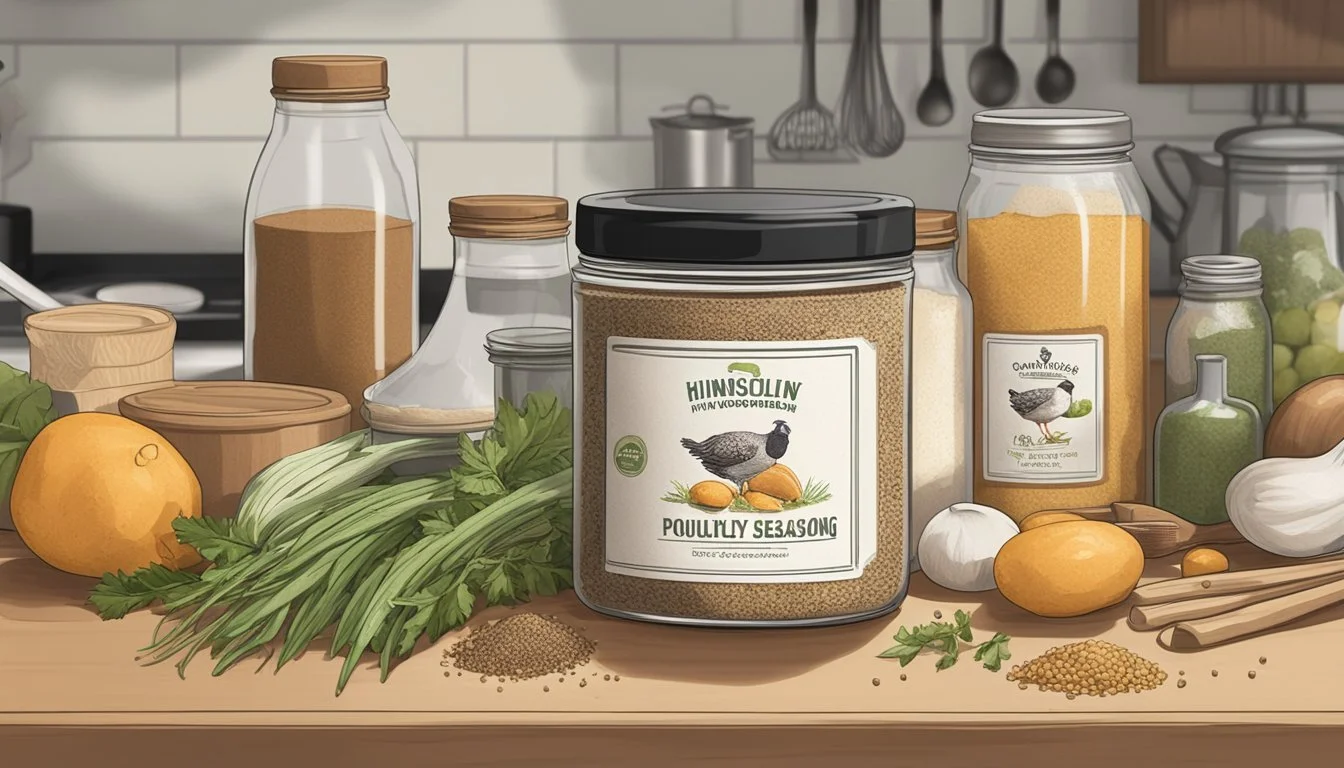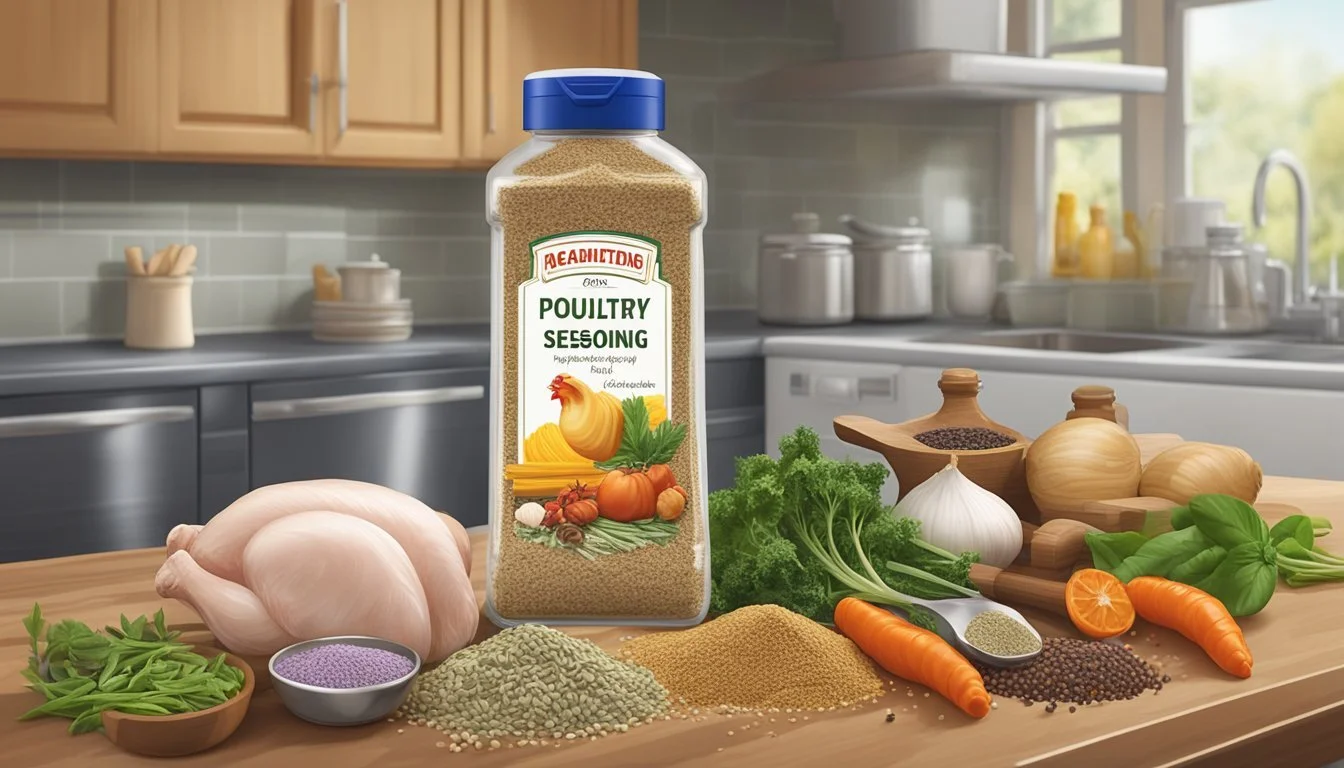Does Poultry Seasoning Expire? Shelf Life, Storage Tips, and Signs of Spoilage
Poultry seasoning, like all culinary herbs and spices, has an expiration date. Yes, poultry seasoning does expire, and its potency diminishes over time. Typically, commercially packaged poultry seasoning maintains its quality for about 1 to 3 years when stored correctly in a cool, dry place away from heat and direct sunlight.
While it might not become unsafe to use, the flavor and aroma that make it a staple in many kitchens will gradually fade. Proper storage, such as keeping it in containers with tight-fitting lids, can help maximize its shelf life and ensure it adds the desired flavors to your dishes.
Understanding the factors that affect the shelf life of poultry seasoning can help in making the most out of this versatile spice blend. Whether you’re an occasional cook or a seasoned chef, knowing how to store and identify when your seasoning has passed its prime is essential for achieving the best culinary results.
Understanding Poultry Seasoning
Poultry seasoning is a dry blend of various herbs and spices that adds flavor and aroma to poultry dishes like chicken and turkey. Its composition and variations can significantly impact the taste of the dishes it is used in.
Composition and Common Ingredients
Poultry seasoning typically contains a mix of herbs and spices. Common ingredients include sage, thyme, marjoram, rosemary, and black pepper. Savory and nutmeg are also frequently found in the blend. Sage and thyme are often the primary flavors, providing an earthy and slightly minty taste.
Additional ingredients like garlic, onion, ginger, and allspice can be included to enhance complexity. Proper balance is crucial, as it ensures the seasoning complements rather than overpowers the dish. These ingredients each add unique flavors, making poultry seasoning a versatile component in culinary applications.
Variations and Homemade Blends
There are many variations of poultry seasoning available in the market, with some blends including additional herbs like oregano, parsley, and paprika. These ingredients can introduce new dimensions to the seasoning, allowing for tailored flavor profiles.
Homemade blends offer customization and control over ingredient quality. Mixing fresh or dried herbs such as sage, thyme, marjoram, rosemary, and black pepper at home can yield a fresher, more potent seasoning. Some may prefer adding white pepper or experimenting with different proportions to match personal taste preferences.
Creating a homemade blend also allows avoiding unwanted additives or preservatives, ensuring a more natural and pure product.
The Role of Poultry Seasoning in Cooking
Poultry seasoning is a versatile blend that enhances the flavors of numerous dishes. This seasoning is essential not only for its classic use in poultry recipes but also for its wide-ranging applications in other culinary creations.
Enhancing Flavors in Recipes
Poultry seasoning is renowned for its ability to elevate the taste of dishes through a mix of fresh herbs and spices. Comprising ingredients like sage, thyme, marjoram, and black pepper, this blend contributes a rich, savory profile to chicken, turkey, and pork. It adds depth and complexity to stuffing and gravies, making it indispensable for Thanksgiving recipes.
In marinades and rubs, poultry seasoning imparts flavors that penetrate deeply into the meat. This results in a more flavorful and delicious dinner. Additionally, this seasoning is adept at bringing out the inherent flavors of roasted vegetables like potatoes and carrots, providing a well-rounded taste experience.
Diverse Uses in Various Dishes
Beyond its role in poultry, this seasoning blend is remarkably versatile. It enhances soups and stews, imparting a robust flavor that enriches the overall dish. When used in vegetarian dishes, it adds a succulent taste that rivals meat-based recipes, making it a suitable choice for those preferring plant-based meals.
In sauces and gravies, poultry seasoning lends a well-balanced taste that harmonizes with other ingredients, creating a cohesive flavor profile. It also shines in Thanksgiving stuffing, where its herbaceous elements complement the other ingredients, giving the dish a festive flair.
For homemade versions, combining fresh herbs like sage and thyme with spices ensures a customized and potentially gluten-free seasoning mix. This tailoring provides an opportunity to experiment and refine recipes to personal preferences. Overall, poultry seasoning's flexibility in diverse culinary applications makes it a kitchen staple.
Shelf Life and Spoilage of Poultry Seasoning
Poultry seasoning, like all spices, has a limited shelf life. Proper storage is essential for maintaining its potency and flavor, and there are clear signs that indicate when it is no longer at its best.
Identifying Signs of Expired Seasonings
Expired poultry seasoning typically loses its potency and flavor over time. One of the first signs is a diminished aroma. If the seasoning no longer gives off a strong scent, it is likely past its prime.
Another indication is the appearance. Clumping can occur due to moisture, but as long as there is no mold or off smell, it may still be usable. Checking for an expiration date on commercial packages helps determine its viability.
Factors Impacting Potency and Freshness
Several factors affect the longevity of poultry seasoning. Storage conditions are crucial. Keeping the seasoning in an airtight container helps retain its flavor and avoids moisture.
A cool, dark place away from sunlight is ideal. Heat and light can deteriorate the quality of the seasoning. Purchasing in bulk can be economical, but only if you can use it before it spoils.
For long-term storage, consider freezing smaller portions. This method can extend the seasoning's shelf life while maintaining its potency. However, ensure the container is suitable for freezing to prevent condensation and clumping.
Best Storage Practices for Prolonging Freshness
Proper storage of poultry seasoning can significantly extend its potency and flavor. Key practices include maintaining the right conditions and using appropriate containers to prevent spoilage and degradation.
Optimal Conditions for Preservation
To maximize the shelf life of poultry seasoning, store it in a cool and dry place. High temperatures and moisture can cause the spices to lose their flavor and texture.
Keep the seasoning away from direct sunlight and heat sources such as the stove or oven. A temperature below 70°F is ideal to minimize degradation.
Moisture control is crucial; areas with high humidity can lead to clumping and mold. Even kitchens can have varying humidity levels, so it's best to store spices in a pantry or cabinet with stable conditions.
Container Selection and Environment Considerations
Using the right container is essential for keeping poultry seasoning fresh. Airtight containers are the best choice to prevent air, moisture, and contaminants from entering. Glass jars with tight-fitting lids are particularly effective, as they are non-porous and do not react with the herbs.
Avoid using plastic containers unless they are high-quality and designed to be airtight. Store spice containers in a clean, dry environment to prevent exposure to contaminants.
Label containers with the date of purchase or expiration to monitor freshness. Regular checks for signs of spoilage, such as discoloration or mold, will help in determining if it's still suitable for use.
Making Your Own Poultry Seasoning
Creating homemade poultry seasoning is straightforward and allows for personal customization to suit specific tastes. By making your own blend, you can ensure freshness and adjust the flavors to your liking.
Simple Homemade Poultry Seasoning Recipe
A basic poultry seasoning blend can be made with common spices found in most kitchens. Here’s a simple recipe:
2 teaspoons ground thyme
2 teaspoons ground sage
1 teaspoon ground marjoram
1 teaspoon dried rosemary
1/4 teaspoon ground black pepper
1/8 teaspoon ground nutmeg
Combine all the ingredients in a small dish and mix well. For a finer texture, use a spice grinder. Store the mixture in an airtight container in a cool, dark place. This recipe yields about half a cup and takes only minutes to prepare.
Customization Tips for Personal Taste
Customization is key to making a poultry seasoning blend that perfectly suits your taste. For those who prefer a more aromatic blend, increase the amount of rosemary and thyme. If you favor a bit more warmth, add a pinch of garlic powder or onion powder.
Balance the intensity by adjusting the quantities of each spice. Ground black pepper adds a hint of heat, while ground sage lends earthiness. Experiment with small batches to find the right combination. Your personalized seasoning can make dishes uniquely yours.
Storing your custom blend properly ensures it remains fresh for up to 6 months. Keep it in an airtight container away from light and heat to maintain its potency.
Health Considerations and Nutrition
The nutritional content and potential allergens present in poultry seasoning are key factors for individuals with specific dietary needs. A detailed examination of these aspects ensures informed usage by those with health concerns or dietary restrictions.
Caloric Content and Dietary Restrictions
Poultry seasoning is low in calories, making it an excellent option for those looking to maintain or reduce caloric intake. Typically, a teaspoon of poultry seasoning contains only a negligible amount of calories, derived mainly from the blend of herbs and spices.
This seasoning blend, which often includes sage, thyme, marjoram, rosemary, black pepper, nutmeg, garlic, savory, and allspice, aligns well with vegetarian diets. Since it comprises purely plant-based ingredients, it's compatible with vegetarian meal plans.
Given its composition, poultry seasoning does not significantly affect macronutrient intake, being primarily used for its flavor rather than its nutritional contribution. The micronutrient content, including trace amounts of vitamins and minerals, is usually minimal and does not notably impact daily nutritional needs.
Gluten-Free and Allergen-Free Options
Poultry seasoning is naturally gluten-free, primarily because its ingredients are solely herbs and spices. It's crucial for individuals with celiac disease or gluten sensitivity to verify that no cross-contamination has occurred during the production process. Purchasing from reputable brands that guarantee gluten-free processing can ensure safety.
For those concerned about allergens, poultry seasoning generally does not contain common allergens like nuts or dairy. However, it is essential to read labels carefully, as manufacturing practices may vary. Some blends might include paprika or garlic, which can occasionally trigger sensitivities in certain individuals.
Ensuring that poultry seasoning is free from artificial additives and preservatives can further reduce the risk of adverse reactions, maintaining its status as a safe and health-conscious choice for a variety of dietary preferences.





